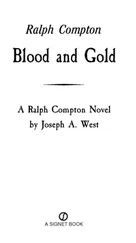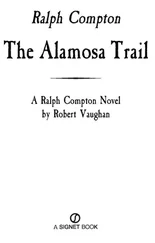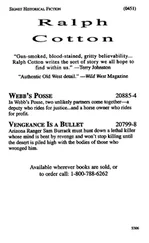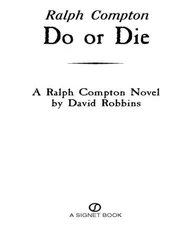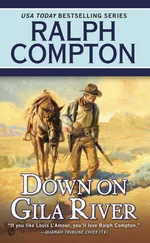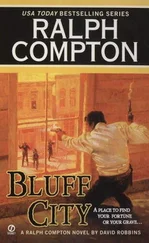Tyree saw the logic in what Boyd was saying. He went back inside the bunkhouse, retrieved the gun belt from the peg and strapped it around his hips, then lifted his Winchester from the rack. When he passed the cabin the door was open. Lorena had her back to him, putting away dishes, and she didn’t turn.
“We’re heading out to make a tally of your pa’s cows,” Tyree said. “Will you be all right here alone?”
“I can use the Sharps about as well as Pa,” the girl answered, still without turning. “I’ll be just fine.”
Tyree pulled his canvas suspenders over his shoulders and settled his hat on his head. He was about to step toward the barn again, but Lorena’s voice stopped him.
“Be careful out there, Chance,” she said. “Those canyons can be treacherous.”
Lorena still had her back to him as Tyree said, “Worried about me, Lorena?”
The girl turned to face him. “Yes, you and Pa and Owen. All of you.”
Tyree could not read Lorena’s eyes. But was there something there, real concern, maybe? Was it something he might hold on to, to give him hope? He had no time to ponder those questions. The girl turned away again, her back straight and stiff.
He stepped through the bright light of the morning, confused, feeling no closer to Lorena now than he had for the past eight days.
Luke Boyd had been right about the steeldust. The horse bucked a few times, enough to justify his reputation, then settled down and seemed eager for the trail.
“We’ll head east along the creek and search the canyons,” Boyd said. He wore a battered black hat, a plaid shirt and corduroy pants tucked into muleeared boots. An old cap-and-ball Remington rode on his hip and, like Tyree, he had a Winchester under his knee.
His Henry shattered and inoperable, Fowler had Luke’s Greener scattergun tied to the back of his saddle with piggin strings, and he wore a Green River knife on his belt. A copy of Thomas Carlyle’s History of Frederick the Great was stuffed into a back pocket of his pants. Seeing the book, Tyree smiled. It seemed Owen planned to do more reading than cowboying.
Lorena stood at the door of the cabin as Tyree and the others rode out, and he waved to her. She waved back, but whether to him or her pa he did not know.
Under a flaming sky streaked with banners of dark blue cloud, the riders followed the creek south. Around them spread a desolate, silent land of high, serrated ridges, great flat-topped mesas, rocky basins and slender spires and pinnacles of pink, red and yellow sandstone. Sparse growths of Douglas fir, mountain mahogany, scrub oak, sagebrush and mountain shrub grew high up the canyon walls, piñon and juniper at the lower levels.
It was still early, but the morning was already hot, the steep, rocky crags on all sides beginning their shimmering dance in the heat. Dust devils spiraled ahead of the riders and sand began to work its way inside their clothes and make their eyes red and gritty. Among the canyons phantom blue lakes glittered, mirages formed by the strengthening sunlight and the clear, dry air.
Along the creek, grazing in the shade of cottonwoods or standing knee high in the cool water, they counted eighty Herefords, all carrying Boyd’s LB brand. The cattle were fat and sleek, wary and wild as deer.
But as they rode Boyd’s eyes were shadowed with concern. He had yet to cut sign of his bull, and that bothered him.
Now the easy part of the tally was over. It was time for the three men to fan out and begin their search of the canyons and draws for the rest of Boyd’s cows.
Tyree took a sandy switchback cattle trail up a sloping ridge and rode down the other side into a narrow gorge. The trail showed signs of recent use, the cattle tracks overlaid with those of deer and antelope. Because of the canyon’s steep walls, little light penetrated to the bottom and Tyree found himself riding in a strange, violet gloaming. Here, away from the sun, the air was much cooler—one reason cattle were so attracted to canyons, including the slots that were just narrow, twisting fissures in the rock.
Tyree found half a dozen cows lying around a shallow seep on the canyon floor where grew a few stunted willows and scattered clumps of sagebrush. The Herefords were reluctant to move back to the heat and flies, but the steeldust knew his business and soon had them up and headed for the canyon mouth.
Tyree hazed the cattle toward the creek and saw Fowler driving another small herd. Boyd, looking grouchy, had ridden into a canyon to the east and had returned empty-handed.
“Damn it all,” the old rancher growled, the heat and dust making his patience wear thin. “I haven’t seen hide nor hair of my bull. Now where in hell has he wandered off to? He always liked to stay close to them cows.”
Tyree took off his hat and wiped sweat from his forehead with the back of his hand. “Still a lot of canyons and draws to search, Luke.” He settled his hat back on his head. “We’ll find him.”
“I sure hope so,” Boyd said. “And I’ll rest a lot easier when we do. I set store by that bull. A time back I read that John Slaughter down in Texas had paid five thousand dollars for a prize Hereford bull. Well, a fool and his money are soon parted I guess, because I guarantee that I bought a better animal for less than half that price.”
By eleven, after four hours of sweaty, grueling work in the growing heat of the day, Tyree and the others had counted over two hundred head. But there was as yet no sign of the bull and that rankled them all, especially Boyd.
At noon, they camped in the shade of a cottonwood by the creek, boiled coffee and broiled slices of salt pork over the fire. Lorena had packed a round of yellow cornbread and a small pot of honey. They spread the corn pone thick with honey, then ate it with the pork.
“Good vittles,” Fowler commented as he brushed crumbs from the front of his shirt. “Stick to a man’s ribs.”
Tyree nodded, smiling. “You’re right about that. Salt pork does stay with a man and it keeps on repeating itself.”
“And Lorena put a good scald on the corn pone—that’s fer sure,” Boyd said. He turned to Tyree. “How you holding up, boy?”
“My side is punishing me some, but I reckon I’ll stick.”
“Good, I’m glad you’re feeling spry, because next we start on the slot canyons. Maybe my bull is in one of them.”
“How are we going to get the cows out of the slots, Luke?” Fowler asked, laying down his book. “Those canyons are so darned narrow there’s no room for a pony to turn and not enough space to swing a cat, let alone a loop.”
Boyd answered Fowler’s question with one of his own. “How long were you in the cattle business before you was sent to the hoosegow, Owen?”
“Not long—a twelvemonth, I guess.” He thought about it. “No more’n a twelvemonth.”
Tyree built a smoke and studied Fowler. The man had the long, melancholy face and sad brown eyes of a poet, and his hands were slender, like a woman’s. He was high-shouldered, his chest narrow and sunken.
Fowler was, Tyree decided, nobody’s idea of a cattleman.
“I was working as a bank clerk over to Crooked Creek when a feller rode in with twenty head of Herefords and a Red Angus bull he was trying to sell,” Fowler said, as though his start in the ranching business needed some explanation. “Well, I was getting mighty tired of the bank, so I withdrew my savings, asked for my time and bought the herd. Cost me just about every cent I owned. Then I pushed them up Hatch Wash, looking for a place to start a ranch, and by and by, I found my canyon. Built my cabin, then had it pretty good for three, four months, until Quirt Laytham moved into the territory with his herd.” Fowler shrugged. “After that, well, you know what followed.”
Читать дальше

